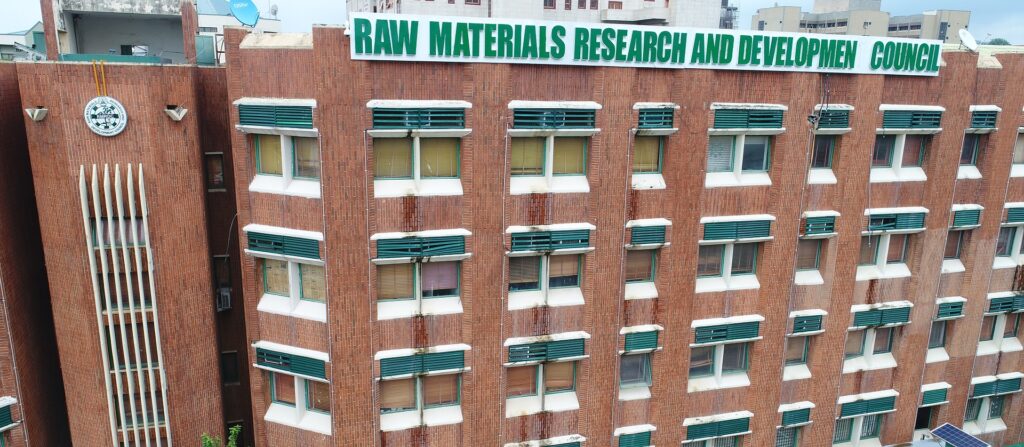By Emma Okereh
Nigeria spends over two trillion naira yearly importing tools and equipment which were being made possible by 3D designs. Stakeholders have argued that by developing capacity and deploying 3D technology skills and designs in manufacturing over the next 10 years, that the nation can save about N30 trillion, create 100,000 new jobs and increase the country’s gross domestic product (GDP) by 30 per cent, and if the recent efforts by the Professor Hussaini Doko Ibrahim-led Raw Materials Research and Development Council (RMRDC) is anything to go by, then we are in for a roller coaster ride in Nigeria to the much tauted industrial Eldorado.

Already, Stakeholders have advocated increased adoption of 3D printing in Nigeria to reduce dependence on importation. They note that the technology can help the country save over N2 trillion expended on spare part importation yearly. The stakeholders argue that that by developing capacity and deploying 3D technology skills and designs in manufacturing over the next 10 years, that the nation can save about N30 trillion, create 100,000 new jobs and increase the country’s gross domestic product (GDP) by 30 per cent.
Many also adduce that the application of 3D printing in the manufacturing sector could spur rapid growth within the sector and hence an increase in Nigeria’s manufacturing GDP contribution as well as other sectors of the economy. And they add that the growth of 3D printing in Nigeria is expected to impact, not only manufacturing but also the education sector, adding that the technology brings to light a set of skills lacking in the Nigerian industrial setting and the opportunity for new teaching practices in science and engineering programs within our tertiary institutions.
Towards this and in view of the inherent advantages of AM to the development and growth of the manufacturing in Nigeria, the Raw Materials Research and Development Council (RMRDC) has partnered with the University of Lagos, and Others to Drive Additive Manufacturing in Nigeria. In a joint communiques made public at the RMRDC House, Lagos, the RMRDC through the Additive Manufacturing Group (AMG) set up in partnership with the University of Lagos, is calling on all relevant stakeholders, including the government to adopt additive manufacturing in the country to achieve rapid industrial growth. The AMG had earlier in the year, organized a bi-local International Conference on Additive Manufacturing in Nigeria to create the necessary awareness on the value of additive the future of computer aided manufacturing in Nigeria.
The communique, which was publicly presented at the RMRDC House, Lekki, Lagos recently, and emanating from a first of a kind arrangement under the present dispensation – the 1st International conference on Additive Manufacturing – reiterated the value and potentials of additive manufacturing to reduce the time and cost involved in tool production, noting that the necessary know-how is developed in case studies an passed to Small and Medium Enterprises (SMEs) within the framework of technology transfer.
The communique’ went on to spell out the fact that SMEs in the country can significantly increase their competitiveness and achieve sustainable business success by using additive manufacturing and the fact that it offers huge opportunities for rapid industrialization of Nigeria in view of its innumerable potentials that can enable the country to leapfrog into the fourth industrial revolution. The concept of additive manufacturing, embraced by the country, can also help solve increasing youth restiveness across the country due to its unique potentials for youth empowerment and wealth creation in recognition of its wide applications across all the manufacturing sectors.
In view of the above, the Council while recognizing that AM is a relatively new technology requiring concerted efforts towards its popularization and acceptance at both public and private sectors levels, accepted to partner with The University of Lagos (UNILAG), the University of Bayreuth, Germany and Manufacturers Association of Nigeria (MAN) to organize the first international conference on additive manufacturing in Nigeria. The Director General and Chief Executive Officer, RMRDC, Prof. Hussaini Ibrahim, said the summit was apt considering the harsh business terrain for manufacturing concerns to thrive. According to him, indeed, manufacturers spend over 40 per cent of their running cost on power in the midst of myriad of challenges already plaguing the sector.
The Director General stated that the conference was designed to spotlight innovative and effective solutions on how additive manufacturing can bring down the cost of manufacturing operations by at least 30 per cent.
In his words: “Manufacturers have been bedeviled with myriads of challenges hindering manufacturing activities, hence the conference would have not come at a better time where manufacturers are seeking innovative ways to boost their profit margins while also reducing their cost of operations.”
Also speaking, a Professor with UNILAG who also doubles as a member of the Additive Manufacturing Group (AMG), Prof. Funsho Falade, said the conference which was organized by the AMG, RMRDC, University of Lagos, Nigeria in partnership with the Campus Additive Innovation, University of Bayreuth, Germany, stated the need for partnership between Nigeria and Germany to advance the development of Additive Manufacturing in Nigeria. He said according to the current statistics in the Wohler Report 2021, Germany is the global market leader for additive manufacturing and the baseline activity on a national level can therefore be considered good.
“Our African youths with their intellect can easily acquire the ‘new thinking’ required by this technology as knowledge of any past manufacturing technologies is not a pre-requisite. Furthermore, Additive Manufacturing technology being software and design driven allows for innovation and creativity in developing a large variety of parts and products,” he said.
He added that the promotion of Additive Manufacturing/digital technologies is the future for Nigerian youths and ensuring sustainable employment opportunities.
He said during the conference, there would be virtual presentations from University of Bayreuth, Germany and Massachusetts Institute of Technology, USA while on-site presentation will be made from University of Lagos on the current stages of development in Additive Manufacturing both in Germany and Nigeria and the possible areas of collaborations between the two countries.
Additive Manufacturing or 3D Printing is the construction of a three-dimensional object from Computer Aided Design (CAD) model or a digital 3D model. It can be done in a variety of processes in which material is deposited, joined or solidified under computer control, with material being added together, typically layer by layer. It is a newly developed Manufacturing Technology that is widely accepted worldwide in the advanced world. Additive manufacturing is revolutionizing the industrial production landscape. The emergence of 3D printing technology has the potential to transform businesses, geographical challenges, and entire supply chains. With less time to design and manufacture products; with minimum need for warehouses for inventory; with spare parts printed on demand; evidently, a great leap in our industrialization transformation is imminent.
Experts are of the opinion that there is no sector or industry that 3D technology is not useful in; be it education, engineering, housing, printing and manufacturing and that the benefits of additive manufacturing are numerous, and the major benefits include faster production, unlimited shapes and geometry, very low start-up costs, and lack of material wastage.
Consequently, the communique at the end of the International conference held that there is a need for an inventory of all additive manufacturing technology practitioners and agencies in Nigeria, including academia working within the space to create awareness campaign across board with a view to showcasing the potentials through design competitions, selective hands-on workshops and increased cooperation amongst government, industry and academia for the purpose of harnessing the gains inherent in it to develop manufacturing in Nigeria.
“There is also a need to redesign the school curricula to accommodate AM 3D coursework including materials extrusion fundamentals and customisation process, replacement and/or supplement of traditional service processes and spare parts supply strategies by AM to achieve cost-efficiency in production of batch size on demand,” they added.
The communiqué also stated the need for RMRDC to serve as the focal point for the public sector in order to hasten the adoption and implementation of the right policy framework relating to additive manufacturing technology.
It maintained that RMRDC should spearhead policy thrust to promote and/or support efforts at domesticating available additive manufacturing researches, developments and infrastructure.

